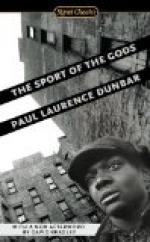It is strange how all the foolish little vaunting things that a man says in days of prosperity wax a giant crop around him in the days of his adversity. Berry Hamilton’s son found this out almost as soon as he had applied at the first of the coloured shops for work.
“Oh, no, suh,” said the proprietor, “I don’t think we got anything fu’ you to do; you ‘re a white man’s bahbah. We don’t shave nothin’ but niggahs hyeah, an’ we shave ’em in de light o’ day an’ on de groun’ flo’.”
“W’y, I hyeah you say dat you could n’t git a paih of sheahs thoo a niggah’s naps. You ain’t been practisin’ lately, has you?” came from the back of the shop, where a grinning negro was scraping a fellow’s face.
“Oh, yes, you ’re done with burr-heads, are you? But burr-heads are good enough fu’ you now.”
“I think,” the proprietor resumed, “that I hyeahed you say you was n’t fond o’ grape pickin’. Well, Josy, my son, I would n’t begin it now, ‘specially as anothah kin’ o’ pickin’ seems to run in yo’ fambly.”
Joe Hamilton never knew how he got out of that shop. He only knew that he found himself upon the street outside the door, tears of anger and shame in his eyes, and the laughs and taunts of his tormentors still ringing in his ears.
It was cruel, of course it was cruel. It was brutal. But only he knew how just it had been. In his moments of pride he had said all those things, half in fun and half in earnest, and he began to wonder how he could have been so many kinds of a fool for so long without realising it.
He had not the heart to seek another shop, for he knew that what would be known at one would be equally well known at all the rest. The hardest thing that he had to bear was the knowledge that he had shut himself out of all the chances that he now desired. He remembered with a pang the words of an old negro to whom he had once been impudent, “Nevah min’, boy, nevah min’, you ’s bo’n, but you ain’t daid!”
It was too true. He had not known then what would come. He had never dreamed that anything so terrible could overtake him. Even in his straits, however, desperation gave him a certain pluck. He would try for something else for which his own tongue had not disqualified him. With Joe, to think was to do. He went on to the Continental Hotel, where there were almost always boys wanted to “run the bells.” The clerk looked him over critically. He was a bright, spruce-looking young fellow, and the man liked his looks.
“Well, I guess we can take you on,” he said. “What ’s your name?”
“Joe,” was the laconic answer. He was afraid to say more.
“Well, Joe, you go over there and sit where you see those fellows in uniform, and wait until I call the head bellman.”
Young Hamilton went over and sat down on a bench which ran along the hotel corridor and where the bellmen were wont to stay during the day awaiting their calls. A few of the blue-coated Mercuries were there. Upon Joe’s advent they began to look askance at him and to talk among themselves. He felt his face burning as he thought of what they must be saying. Then he saw the head bellman talking to the clerk and looking in his direction. He saw him shake his head and walk away. He could have cursed him. The clerk called to him.




